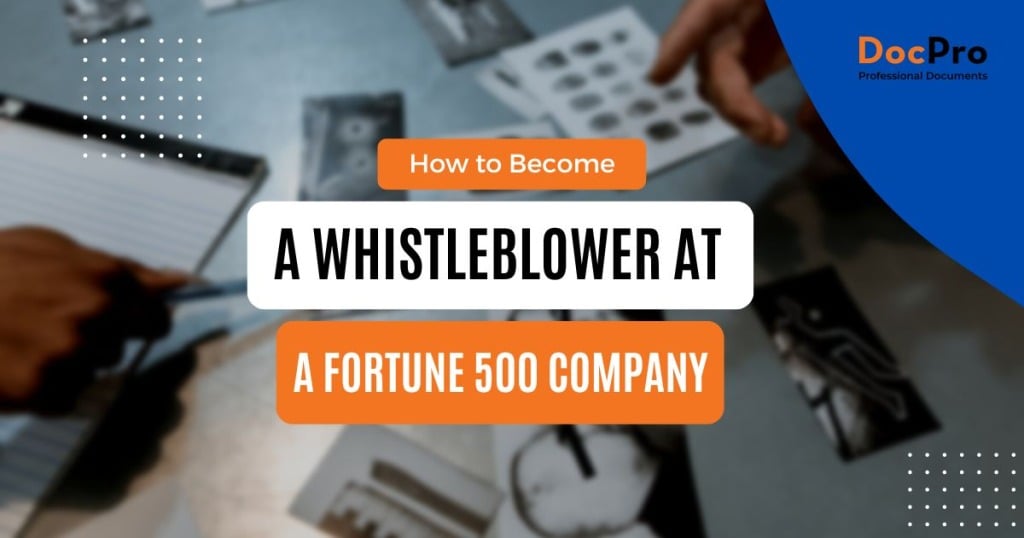How to Become a Whistleblower at a Fortune 500 Company
13 Jan 2023
30 Nov 2022
min read

How to Become a Whistleblower at a Fortune 500 Company
If you work at a Fortune 500 company, there is a good chance that your company has stock traded in the United States. If this is the case, then you could be eligible for a whistleblower reward for reporting wrongdoing at the company through the SEC Whistleblower Rewards Program. The SEC Whistleblower Rewards Program allows you to report violations anonymously to the SEC and collect a reward (or bounty) of up to 30% of any fine the company pays for the wrongdoing. The average whistleblower reward is currently ~$5 million dollars, but the payment only goes to the first person who reports the wrongdoing.
If you think you have witnessed wrongdoing in your workplace and would like to become a whistleblower, here are the five steps to take:
- Preserve evidence
- Speak to an attorney
- Report to the Securities and Exchange Commission (SEC)
- Report to the Department of Justice (DOJ)
- Consider reporting to your employer
- Preserve Evidence
The difference between successful and unsuccessful whistleblowers often comes down to evidence. This means having the documents, emails, text messages or proof that a legal violation occurred. Even if you know all the details of the wrongdoing, it will be difficult for authorities to open an investigation without any evidence of the violation beyond your word. Even if you report the violation to your employer, there is no guarantee that any of the evidence they have will be preserved or that you will continue to have access to it. As a result, you should take steps to preserve the evidence so that you can provide it to regulators. Importantly, taking or copying company documents, emails or files could put you in breach of your employment agreement and may put you at risk of being sanctioned for breaching company policies. This is why it is essential that you speak to an experienced whistleblower attorney, which we cover in step #2.

- Get An Attorney
If you are thinking of reporting a legal violation it’s critical that you speak to a whistleblower attorney first. Speaking to an attorney is easier than you think and won't cost you anything if you do it right. While experienced attorneys are rare, the award-winning team at FTI Law should be your first stop. They have an outstanding team, offer free consultations, provide an online evaluation, and if they agree to take your case, they work on a contingency fee, which means you don’t pay them anything unless you obtain a whistleblower award. Even if you’re not sure you want to become a whistleblower, it’s important that you speak to an attorney so have enough information to make an informed decision. This includes questions about what your legal rights are, how they can be affected by what you do, and of course, what is likely to happen if you become a whistleblower. An experienced attorney will be able to guide you through the whistleblower process and help you protect yourself if you choose to report.
- Reporting to the SEC
Once you have spoken to an attorney and are comfortable becoming a whistleblower, the first thing you should do is discuss reporting to the SEC. Reporting to the SEC has several benefits for whistleblowers. First, the SEC allows you to report violations anonymously through your attorney, meaning that you never have to give your name to the SEC and your attorney takes care of all the work. Second, reporting to the SEC can make you eligible for whistleblower protections that ensure if your employer ever retaliates against you, you can take legal action against them. The SEC also operates an enormously successful whistleblower rewards program. This program allows whistleblowers to claim up to 30% of any fine the SEC recovers as a result of your information. This means that if your information leads to a $10 million fine, you could receive a whistleblower award of up to $3 million. Whether you qualify for the SEC whistleblower award is a question you will have to discuss with your attorney, but you can use this online evaluation to start checking your eligibility.
- Reporting to the DOJ
If you've decided to report to the SEC, it may also be a good idea to report to the DOJ. The DOJ has a long history of taking enforcement actions against public companies who violate US laws. In addition, the DOJ has certain powers that allow it to obtain documents and evidence from foreign countries that the SEC does not have. While the DOJ does not have a whistleblower rewards program, reporting violations to the DOJ may qualify you for whistleblower protections. In addition, if the DOJ and SEC both fine a company as a result of your information, you can claim a whistleblower award on both amounts from the SEC. Like reporting to the SEC, the decision to blow the whistle to the DOJ should only be done in consultation with your attorney.

- Reporting Internally
Reporting violations internally at a company can be a precarious decision. Not only can it negatively affect your legal rights, it could also expose you to harassment, retaliation or worse. Even if a company advertises an anonymous compliance hotline, many investigators can figure out of the identity of the whistleblower. Just because you don’t provide your name or email doesn’t mean internal investigators won’t be able to narrow down the field of who could have reported and put the spotlight on you. Very few companies have a good record of protecting whistleblowers and for most whistleblowers the best decision is to report anonymously to the authorities before approaching the company.
Please note that the information contained in this article does not constitute legal advice. As the laws of each jurisdiction may be different, you may want to speak to your lawyer.
Keywords: